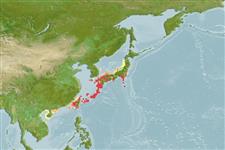Classification / Names
Common names | Synonyms | Catalog of Fishes(genus, species) | ITIS | CoL | WoRMS | Cloffa
Teleostei (teleosts) >
Kurtiformes (Nurseryfishes, cardinalfishes.) >
Apogonidae (Cardinalfishes) > Apogoninae
Etymology: Siphamia: A Swazi word, siphama, for a fish; senoui: This species is named senoui in honour of Dr. Hiroshi Senou of the Kanagawa Prefectural Museum of Natural History. Dr. Senou, in collaboration with various Japanese colleagues, has been largely responsible for a marked increase in our knowledge of tropical reef fishes occurring in southern Japan and the adjacent Ryukyu Archipelago. He also collected and photographed the holotype and most paratypes of this species. (Ref. 90035).
Eponymy: Dr Hiroshi Senou of the Division of Fishes, Kanagawa Prefectural Museum of Natural History, has been a leader in the drive to find more about the tropical reef fishes occurring in southern Japan and the adjacent Ryukyu Archipelago. [...] (Ref. 128868), visit book page.
Environment: milieu / climate zone / depth range / distribution range
Ecology
Marine; benthopelagic; depth range 10 - 35 m (Ref. 90035). Tropical
Pacific Ocean: Japan (Ref. 90035)
Size / Weight / Age
Maturity: Lm ? range ? - ? cm
Max length : 1.9 cm SL (female)
Short description
Identification keys | Morphology | Morphometrics
Dorsal rays VII+I,9; anal rays II,8; pectoral rays 12 (rarely 11 or 13); tubed lateral-line scales 3-8; median predorsal scales 4-5; total gill rakers 3-4 + 9-11 = 12-14; developed gill rakers 1-2 + 8-9; gill rakers on ceratobranchial 6-7. Body depth 2.3-2.7 in SL and body width 1.95-2.25 in the depth; eye diameter 2.65-3.1 in head length; first dorsal spine 2.3-10.3 in second spine; second dorsal spine 4.35-6.2, spine of second dorsal fin 3.5-4.4,and second anal spine 4.7-5.6, all in head length; pectoral-fin length 4.4-4.95 and pelvic-fin length 4.1-4.9 in SL;caudal-peduncle length 1.1-1.5 in distance between pelvic spine insertion and anal-fin origin. Preopercular edgeweakly serrate around angle, with 4-15 (usually 7-12) minute serrations; preopercular ridge smooth. Tip of light organon each side of tongue bound by membrane (Ref. 90035).
Life cycle and mating behavior
Maturity | Reproduction | Spawning | Eggs | Fecundity | Larvae
Gon, O. and G.R. Allen, 2012. Revision of the Indo-Pacific cardinalfish genus Siphamia (Perciformes: Apogonidae). Zootaxa 3294:1-84. (Ref. 90035)
IUCN Red List Status (Ref. 130435: Version 2024-1)
Threat to humans
Harmless
Human uses
Tools
Special reports
Download XML
Internet sources
Estimates based on models
Phylogenetic diversity index (Ref.
82804): PD
50 = 0.5000 [Uniqueness, from 0.5 = low to 2.0 = high].
Bayesian length-weight: a=0.01445 (0.00680 - 0.03071), b=3.07 (2.89 - 3.25), in cm total length, based on LWR estimates for this (Sub)family-body shape (Ref.
93245).
Trophic level (Ref.
69278): 3.0 ±0.4 se; based on size and trophs of closest relatives
Resilience (Ref.
120179): High, minimum population doubling time less than 15 months (Preliminary K or Fecundity.).
Fishing Vulnerability (Ref.
59153): Low vulnerability (10 of 100).
